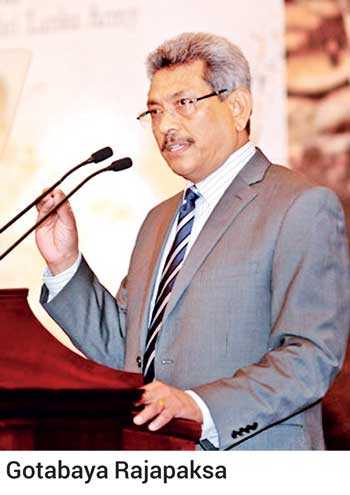Tuesday Feb 24, 2026
Tuesday Feb 24, 2026
Saturday, 23 February 2019 00:10 - - {{hitsCtrl.values.hits}}
 Marketing slogans must match reality
Marketing slogans must match reality
There’s nothing like a well-crafted marketing slogan for a prospective Presidential candidate. Gotabaya Rajapaksa is emerging more clearly into the daylight as the Opposition’s candidate for executive president. Against a redone image in the background of a library of books one observes our Gota, with appropriate gestures of hands, pontificating something we didn’t know: “How can we have freedom without discipline?”
Fortunately, the slogan hasn’t any racist connotations. ‘Discipline’ is his point of emphasis. The implication is that, if elected, Gota will guarantee discipline and then you can have your freedom.
The problem about all this is that a marketing program must match with reality. Gota’s doesn’t.
No match
Both Gota’s library background and his slogan cries for that matching experience. A man who has not gone beyond the formal O/Level cannot be expected to be perceived as someone who is learned. Of course, he has a doctorate; but that is an honorary one granted by our impoverished and rotting universities to placate those in power and satisfy their narcissism. Our Gota will probably use that doctorate sometime in the future.
Let’s take a look at the reality of the 10-year period of rule when Gota ran the show along with his President brother and other family siblings. It is fair to name this period as ‘Gota’s Reign’. Like his other powerful brother Basil, Gota was known to give orders to all and sundry. Although officially a Secretary, everybody knew the truth.
Gota’s discipline was ruthless
The term ‘discipline’ comes from the Latin word,’disciplus,’ and it had something to do with the processes of making kids follow codes or rules of behaviour and enforcing them by bringing in the heavy hand of punishment, if needed. The activation of discipline still remains as punishment. Gota wants to punish us if we do not follow ‘rules.’ That is the only way to maintain discipline.
Now, we know only too well that in his reign punishment was heavy. He himself recently admitted in public that white vans were put into use in that period. All sorts of charges were rife then namely, that anybody who went counter were chastised, sent missing or murdered brutally.
The illustrations of so many missing journalists come to mind and the case of Ekneligoda has come to life after Galaboda Aththe Gnanasara invaded Court when that case came up. There were many murders, the most brutal of them being that of The Sunday Leader Editor, Lasantha Wickrematunge, and that of the young rugby player, Wasim Thajudeen.
Lasantha published documentation that pointed to fraud in the purchase of MIGs for the Defence Ministry that was in Gota’s control. Although it was originally stated that the purchase was a Government to Government deal, it came to light that the purchase had been from a non-existent company in Ukraine. That incident was never investigated even after Lasantha had been ‘disciplined’.
 Thajudeen’s murder was first dressed to be an accident but when the Government changed hands the Court confirmed the youngster had been murdered. The cops had vainly tried to do the dressing and the cops came under the Ministry that Gota ran with an iron hand.
Thajudeen’s murder was first dressed to be an accident but when the Government changed hands the Court confirmed the youngster had been murdered. The cops had vainly tried to do the dressing and the cops came under the Ministry that Gota ran with an iron hand.
In Gota’s reign the ruthless iron hand of discipline was indeed exercised and the public must be thankful to Gota for having shown what discipline meant, in the sense he used the relevant devices.
Where then was freedom under Gota’s discipline? For the millions of powerless, freedom was not there since the population was living with a Damocles sword over their heads. That sword could be exercised at local level by the corrupt elite of Pradeshiya Sabhas who had won recognition from the top; it reached up to the highest supremo levels at varying degrees of intensity. The simple explanation is that Gota’s discipline wasn’t an objective phenomenon but one that had been applied subjectively. The discipline itself was indisciplined. Such a discipline cannot bring forth freedom
Six flaws in Gota’s discipline
The problem in Gota’s discipline was manifold. First, the iron hand was not exercised to cover all disobeyers. The 100-exceeded cabinet of Ministers that his powerful brother headed had a majority whose names are involved with theft of taxpayer money, embezzlement of funds, bribery and so on. Many ministers of that era are lined up in Court today.
Second, according to charges now levelled against him, Gota had not himself set an example in discipline. The best discipline is self-imposed but there is a case before court that our supremo had embezzled Treasury funds in order to build a monument for his dear dad. (Ironically, this contrasts with the recent pictures showing Prime Minister Ranil Wickremesinghe developing a poor temple out of his own personal funds.) What transpires as far as evidence and judgment in the Gota case is not for us to predict. The independent Judiciary will decide in a week or so – and that isn’t far away.
Third, Gota’s discipline had been selectively abused. The dramatic example was that of the jailing of our then Army Commander who fought and won the war in the battlefield – Sarath Fonseka (SF). The objections laid by SF at the time was that officers he had punished and who were persona non-grata with the latter were appointed to a cooked-up military court.
In the first place the choice of using a military court instead of resorting to our civil Judiciary had been a controversy. However, Gota and his brother thought otherwise and, in a case that provoked the headlines “Shame!” in our otherwise ‘disciplined’ national press, concluded with SF being thrown to jail.
On the other hand, there was no discipline exercised at other levels where the Rajapaksa cohorts were appointed to run. Examples are SriLankan Airlines and the Ambassadors in Washington and Russia – all run by Gota relatives.
Fourth, the foundation for civil discipline in any democratic country is the Judiciary. However, it is public knowledge that our Judiciary had been ruined under Rajapaksa control. The Chief Justice was allegedly a man like the Eveready battery – ready to follow orders. Key decisions were taken in Temple Trees.
Fifth, discipline is something that should be logically extended to cover other areas such as the government’s financial transactions. Financial discipline under Gota’s reign came to virtual zero as knowing persons watched with dismay when taxpayer funds were wasted at will in extravagant ministerial behaviour and ill-considered projects like the International Airport at Mattala. At the time of the fall of the regime in 2015 the country had been rendered almost broke.
Finally, the above considerations point to the fact that the discipline in Gota’s reign was meant to apply only to the millions of powerless people. The few hundreds who were under the sunshine of the controlling elite were safe with their indiscipline.
The prominent illustration had been at Rathupaswala where farmers had genuinely protested against the pollution of their underground water systems. They were shot by soldiers who belonged to the Defence Ministry. The previous shooting and killing at the garment factory premises in Katunayake was similar.
The term ‘discipline’ comes from the Latin word,’disciplus,’ and it had something to do with the processes of making kids follow codes or rules of behaviour and enforcing them by bringing in the heavy hand of punishment, if needed. The activation of discipline still remains as punishment. Gota wants to punish us if we do not follow ‘rules.’ That is the only way to maintain discipline. Now, we know only too well that in his reign punishment was heavy. He himself recently admitted in public that white vans were put into use in that period. All sorts of charges were rife then namely, that anybody who went counter were chastised, sent missing or murdered brutally
Where, then, was freedom?
Where then was freedom under Gota’s discipline? For the millions of powerless, freedom was not there since the population was living with a Damocles sword over their heads. That sword could be exercised at local level by the corrupt elite of Pradeshiya Sabhas who had won recognition from the top; it reached up to the highest supremo levels at varying degrees of intensity. The simple explanation is that Gota’s discipline wasn’t an objective phenomenon but one that had been applied subjectively. The discipline itself was indisciplined. Such a discipline cannot bring forth freedom.
(The writer can be reached via [email protected].)